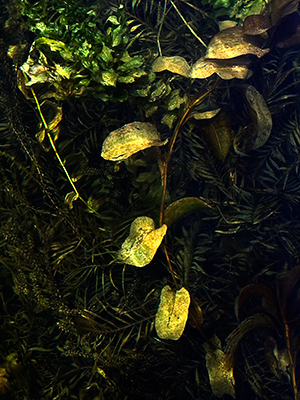 I started upright, feet planted in the lake’s silt, bending my knees and inclining forward, but never losing touch with where I stood. Gradually I let go of the bottom and put my head in the water, face down, eyes closed, legs splayed out behind me like a flesh-colored overcoat—like a drowned person whose body has become bloated and will have to be fished out.
I started upright, feet planted in the lake’s silt, bending my knees and inclining forward, but never losing touch with where I stood. Gradually I let go of the bottom and put my head in the water, face down, eyes closed, legs splayed out behind me like a flesh-colored overcoat—like a drowned person whose body has become bloated and will have to be fished out.
The object was to float face down and let the water move me as it wanted, to surrender my will. “Let go,” my sister said. She was my instructor in all things, and taught me how to swim. “Let go,” she intoned as she slipped her arms under my stomach, lifting my feet and legs up from the bottom, horizontal. “Stop clenching your toes, it won’t get you anywhere.” Up my legs rose until I was stretched out upon the water in my sister’s arms.
Soon I was shoving off into deeper water whose bottom I couldn’t touch. I looked down to what lay under the lake’s surface, but could only sense shadows flickering on a cave’s wall. It never occurred to me to look up. I swam on my stomach, neck arched down, face submerged, intent on getting somewhere—
To the far end of the lake
To the other side of the quarry
To the lighthouse
To the dock buoyed in the middle of the blue
To the magical number 85.
There was always something ahead of me I had to reach.
Then something happened. My legs stopped kicking, and I flagged vertical, a sudden period in the water’s graph. I lost forward momentum and it never returned. Some thing, some impulse or invisible hand turned me onto my back, flipping me over to a place I have never been and never wanted to be. Some agent of change I couldn’t see or name; it was not my sister who slipped her arms under my back to support me. Dead now, she couldn’t say, “Let go, Marcia. I’m holding you.” I had to do this for myself. “Put your head back, let the water cradle you, look up at the trees arching over the lake and the white sky poking through the trees’ armpits.”
I use a windmill motion, both arms cycling simultaneously, catching and recovering at the same time. It looks odd. We’re used to seeing the arms rotate through the water in an alternate pattern, 1,2, 1,2, while the feet and legs flutter kick continuously. But I don’t follow the pattern. I reach my arms together, straight over my head, then opening both arms, turn them flat like paddles, and pull them against the water until they are parallel to my side. I’m on my back, spread open under the sky, held aloft by an invisible chain of arms beneath me, one hand clasps another and I’m waiting, in a posture of readiness.
On my back I can’t see where I’m going, but there’s no where I care to get to anymore. Everywhere I am is here.
—
Marcia Aldrich teaches creative writing at Michigan State University. She is the author of Girl Rearing, published by W.W. Norton and part of the Barnes and Noble Discover New Writers Series. She has had essays appear in The Best American Essays, The Beacon Book of Essays by Contemporary American Women, and a wide range of literary magazines such as The North American Review, The Seneca Review, The Gettysburg Review. In spring 2010, she was the Mary Routt Chair of Writing at Scripps College. She is the senior editor of Fourth Genre: Explorations in Nonfiction.
Photo by Ryan Rodgers
